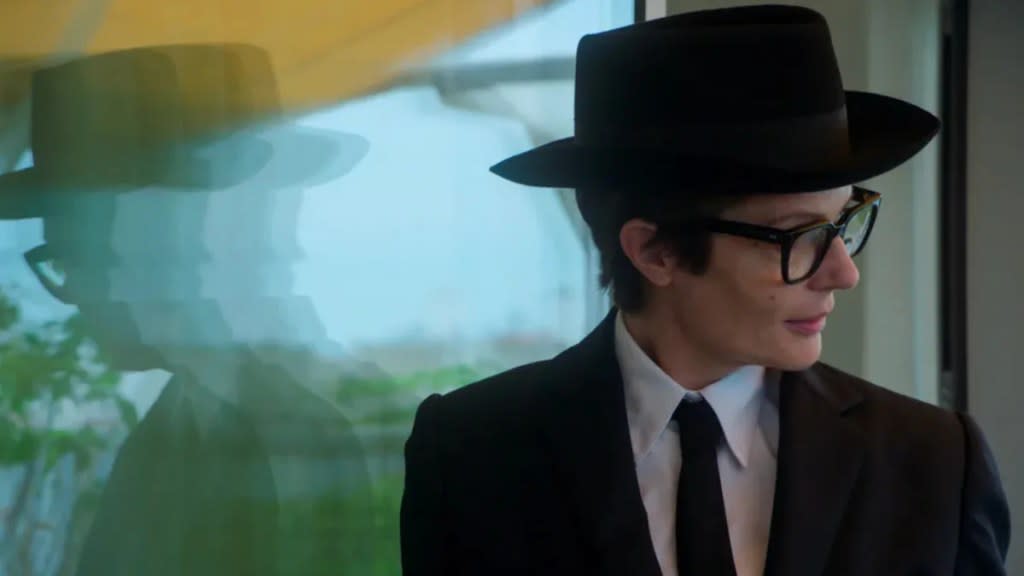‘Marcello Mio’ Review: Christophe Honoré’s Charming Comedy Boasts a Terrific Chiara Mastroianni

When the phrase “nepo baby” gets thrown out in Christophe Honoré’s “Marcello Mio,” there is no escaping how jarring it sounds to the ear. Part of the surprise comes from the context in which it’s said: a sudden altercation with the closest thing this relaxed film has to an antagonist. However, it also stands out as an oddly modern interjection in what otherwise feels like a distinctly old-fashioned film. This is not a criticism, per se — the moment marks where it feels as though the two sensibilities have sharply come crashing together.
The moment also makes “Marcello Mio” a nepo baby movie to end all nepo baby movies. The reason it rises to the top is its wonderful lead performance by Chiara Mastroianni, playing a version of herself. Daughter of the great Catherine Deneuve, who costars in the film, and the late Marcello Mastroianni, she is living in the long shadow of them both while trying to figure out what she wants to do with her life. After finding things at a standstill, she starts to dress up as Marcello and move through the world as him. This proves compelling to some and confusing to others. For Mastroianni, it’s not just her best role yet, but a way to connect with the father she lost while making sense of her own life. Though ultimately fleeting, Honoré’s is a comedy as gently silly as it is sincerely sweet.
Premiering Tuesday evening in competition at the 2024 Cannes Film Festival, the film kicks off with an appropriately ridiculous scene involving a fountain photoshoot where Mastroianni is bombarded with water, wind and the shouts of a photographer. When she then goes to work on a scene for an upcoming project, the direction she is given all connects back to her parents rather than her.
The actress plays such moments cheekily and appears more than game to poke fun at herself. When her character goes out for a walk one night, she attempts to disguise herself so that she isn’t recognized. The humor comes when a stranger stops her. With Chiara looking over her glasses at the woman in search of some spark of recognition in her eyes, she asks if she can spare a light. Chiara is hilariously frustrated by that being the extent of the encounter, cursing the woman as she departs. She both does and does not want to be perceived.
Stepping into the role of her late father becomes a fitting solution to her problems. It in ways allows Mastroianni to be more herself than she could be before. Inviting a variety of readings about gender, performance and legacy, it’s not as chaotic a portrait of fame as other Cannes films like the much-discussed “The Substance,” but that suits it just fine. Honoré isn’t interested in spectacle as much as he is sweetness.
All of this is informed by thoughtful writing and playful performances. Breaking down gender roles is good fun, and we see Mastroianni come to life when she begins to do so. She brings an integral nuance to her performance within a performance, making clear that all of life itself is such a ruse. How we dress, act or engage with the world is a reflection of all of this. The actress herself is often consciously talking about such a life, speaking aloud about how she feels about the whole thing without ever “breaking character.”
Through every small choice she makes, it feels like we’re getting a look at a person who is not solely defined by her family or the world’s perception of her. Yes, her taking on the “role” of her late father is certainly unique and still tied to her parents, though it is all about opening a door. She’s creating for herself, connecting with a new state of being and reconnecting with her father all at once. This isn’t portrayed with rose-tinted glasses, as there are complications that get interwoven into the film, but brief snapshots that slow down to show her past at a younger age are unexpectedly moving. The film is primarily a comedy, but it still has dramatic resonance.
There are moments, however, where “Marcello Mio” can feel like it is losing some of its richer texture. When Mastroianni forms a connection with a troubled soldier named Colin, played by Hugh Skinner of the series “Fleabag,” the great melancholic introductory scene the two share feels promising. Alas, the more complicated relationship gets lost in the shuffle ever so slightly, feeling like something the film wants to revisit more than it does only to do so surprisingly infrequently.
Still, this all becomes water under the bridge — or, rather, water in a fountain that Mastroianni returns to in one key scene. It’s a cathartic moment where she is able to swim without being scrutinized, but that is quickly undercut when she gets caught and arrested. Though the film remains light on its feet, such moments remind viewers of how there are many things that will try to hold one back from being free to explore what it is they want for themselves.
Whether it is the weight of family, friends or society writ large, seeing Mastroianni cast this aside ensures “Marcello Mio” has plenty of heart amidst the comedy. When she finally can just float freely in the end, all of the journey comes together. She may be a nepo baby, but this is a film of rebirth all her own.
The post ‘Marcello Mio’ Review: Christophe Honoré’s Charming Comedy Boasts a Terrific Chiara Mastroianni appeared first on TheWrap.

 Yahoo News
Yahoo News 
